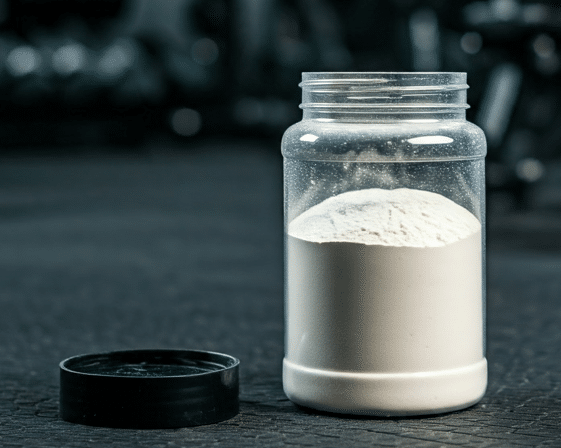L-Citrulline: The Powerhouse Amino Acid for Boosting Athletic Performance
L-citrulline is quickly becoming a go-to supplement for athletes and fitness enthusiasts looking to improve their performance. You’ve probably seen it in pre-workout formulas or as a stand-alone supplement, but what exactly is L-citrulline, and how can it benefit your workouts? In this blog, we’ll dive deep into what L-citrulline is, how it works, and why it’s gaining popularity in the fitness world.
What is L-Citrulline?
L-citrulline is a naturally occurring amino acid found in certain foods, like watermelon, cucumbers, and pumpkins, as well as produced by your body. Unlike other amino acids that are used to build proteins, L-citrulline serves a different role—it helps boost blood flow and improve athletic performance. It’s often used to support cardiovascular health and enhance exercise endurance and recovery.
The name “citrulline” comes from the Latin word citrullus, meaning watermelon, where it was first discovered. Today, L-citrulline is widely used as a supplement, particularly in the fitness and bodybuilding communities, thanks to its ability to increase nitric oxide production and promote better circulation.
How Does L-Citrulline Work?
L-citrulline works in the body by converting into another amino acid called L-arginine, which then leads to the production of nitric oxide. Nitric oxide is a molecule that helps relax and widen blood vessels, improving blood flow throughout the body. This process, called vasodilation, increases the delivery of oxygen and nutrients to muscles during exercise, which can enhance your endurance and reduce muscle fatigue.
Unlike L-arginine supplements, which are also used to boost nitric oxide levels, L-citrulline is more effective because it’s better absorbed by the body. This makes L-citrulline a preferred choice for those looking to optimize their workout performance.
Benefits of L-Citrulline
Improved Blood Flow and Circulation
The main benefit of L-citrulline is its ability to increase nitric oxide levels, which improves blood flow. This enhanced circulation delivers more oxygen and nutrients to your muscles during exercise, allowing you to perform better and recover faster. Improved blood flow also means less muscle soreness after intense workouts, helping you get back to training sooner.
Increased Endurance and Reduced Fatigue
L-citrulline can help delay the onset of muscle fatigue by improving blood flow and reducing the accumulation of ammonia in the muscles. This means you can work out for longer periods without feeling exhausted. Whether you’re a long-distance runner, cyclist, or weightlifter, L-citrulline can help you maintain high performance throughout your workout.
Enhanced Strength and Power Output
For those engaged in high-intensity strength training, L-citrulline can increase your ability to lift heavier weights or complete more reps. By improving the efficiency of energy production in your muscles, L-citrulline allows you to push harder during sets, leading to better strength gains over time.
Faster Recovery and Less Muscle Soreness
Another benefit of L-citrulline is its role in reducing post-workout muscle soreness, often referred to as delayed onset muscle soreness (DOMS). Studies have shown that L-citrulline can help minimize muscle soreness after intense exercise, allowing you to recover faster and train more frequently without feeling as stiff or sore the next day.
Cardiovascular Health Support
In addition to its performance-boosting benefits, L-citrulline supports heart health by improving blood vessel function and promoting healthy blood pressure levels. This makes it a valuable supplement not just for athletes, but for anyone looking to support long-term cardiovascular health.
Foods Rich in L-Citrulline
While L-citrulline supplements are widely available, you can also find this amino acid in certain foods. Some of the best natural sources of L-citrulline include:
- Watermelon: The most well-known source, with high concentrations of L-citrulline in the flesh and rind.
- Cucumbers: Another refreshing food that contains small amounts of L-citrulline.
- Pumpkin: Seeds and flesh of pumpkins contain L-citrulline.
- Squash: A good source of various amino acids, including L-citrulline.
Eating these foods can provide some L-citrulline, but most people opt for supplements to achieve the dosages needed for athletic performance benefits.
L-Citrulline Dosage and How to Take It
To experience the full benefits of L-citrulline, you need to take it in the right amounts. Here’s a general guide to dosage and timing:
Standard Dosage
The typical dose of L-citrulline for performance enhancement is between 6 and 8 grams per day. This amount has been shown in studies to effectively boost nitric oxide levels and improve endurance and strength during exercise.
L-Citrulline vs. Citrulline Malate
L-citrulline is available in two main forms: L-citrulline and citrulline malate. Citrulline malate combines L-citrulline with malic acid, which can enhance the production of energy in the muscles. If you’re looking to maximize your workout performance, citrulline malate may provide additional benefits compared to pure L-citrulline. The typical dosage for citrulline malate is slightly higher, around 8 grams per day.
Timing
It’s best to take L-citrulline or citrulline malate about 30–60 minutes before your workout to allow enough time for it to be absorbed and start boosting nitric oxide levels. You can also split your dose and take half in the morning and half before your workout for sustained benefits throughout the day.
Stacking with Other Supplements
L-citrulline pairs well with other performance-enhancing supplements like creatine, beta-alanine, and caffeine. Many pre-workout formulas contain L-citrulline alongside these ingredients to give you a complete performance boost.
L-Citrulline Side Effects and Safety
L-citrulline is generally considered safe when taken in appropriate doses. Most people tolerate it well without experiencing any side effects. In some cases, taking too much L-citrulline may cause mild gastrointestinal discomfort, such as bloating or stomach cramps. If you experience these symptoms, try lowering your dose or splitting it into smaller amounts throughout the day.
Because L-citrulline helps lower blood pressure by increasing nitric oxide production, individuals with low blood pressure or those taking medications for blood pressure should consult their doctor before using L-citrulline supplements.
L-Citrulline Myths and Misconceptions
There are some common myths surrounding L-citrulline, so let’s clear them up:
- Myth: L-citrulline provides an immediate energy boost.
While L-citrulline improves endurance and reduces fatigue, it doesn’t provide an immediate energy rush like caffeine. Instead, it works by gradually improving blood flow and muscle efficiency, so its effects are more noticeable over time. - Myth: L-citrulline is only for bodybuilders.
While bodybuilders can benefit from L-citrulline, it’s not just for those who lift weights. Endurance athletes, runners, cyclists, and anyone involved in high-intensity exercise can benefit from the enhanced endurance and recovery that L-citrulline provides.
Conclusion
L-citrulline is a versatile supplement that offers a wide range of benefits for athletes and fitness enthusiasts. Whether you’re looking to boost your endurance, enhance strength, or improve recovery, L-citrulline can be a powerful addition to your supplement stack. Its ability to increase nitric oxide production and improve blood flow makes it a valuable tool for anyone looking to push their limits in the gym or on the field.
As with any supplement, it’s important to take L-citrulline consistently and at the right dosage to experience its full benefits. Whether you’re new to L-citrulline or already incorporating it into your routine, it can be a game-changer for reaching your fitness goals.



One Reply to “L-Citrulline”
Comments are closed.